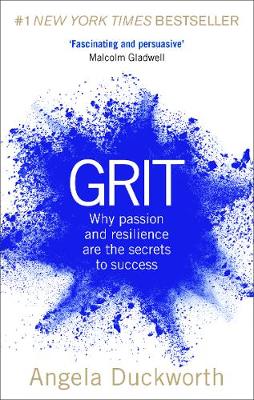Grit, written by Angela Lee Duckworth, is a book that simply reinforces the point that there’s no substitute of hard work. It adds a whole lot of scientific backing and examples that explains one of my favourite quotes “Karne se hi hoga, Baba nahi karwaega! (It’ll happen only if you do it, no saint is going to do it for you)”. Below is my interpretation of the book –

- What is it that defines a winning mindset? Winners hate losing
- Businessman – to be able to take calculated decisions about millions of dollars and still go to sleep at night
- Artists – they like making stuff
- Athletes – winners love to go head to head with other people.
- The highly accomplished were paragons of perseverance. They were opposite of complacent. Yet, in a very real sense, they were satisfied being unsatisfied
- Not just determination but direction
- I grew less and less convinced that talent was destiny and more and more intrigued by the returns generated by effort
- The human individual lives usually far within his limits. He possesses powers of various sorts which he habitually fails to use. He energises below his maximum and behaves below his optimum
- As much as talent counts, effort counts twice (EFFORT COUNTS TWICE)
- Superlative performance is really a confluence of dozens of small skills or activities, each one learned or stumbled upon, which have been carefully drilled into habit and then fitted together in a synthesised whole
- But mundanity is a hard sell. You need to jazz it up. You need to make these people more interesting. We rejoice in the fact as though it came out of ground by magic. For if we think of genius as something magical, we are not obliged to compare ourselves and finding ourselves lacking. Mythologizing natural talent lets us all off the hook
- Grit has 2 components: Passion and Perseverance. Enthusiasm is common. Endurance is rare. People can imagine the top level goal but do not have the mid and low level goals that are a means to an end
- Warren Buffett highlights 3 steps –
- write down a list of 25 career goals, do some soul searching and circle the 5 highest priorities
- take a good hard look at the 20 you didn’t select
- Now avoid these at all costs. They’re what distract you; they eat away time and energy
- Is grit more like height (something you can’t control) or language (something you can acquire)? Nature vs nurture! It is dependent upon genes in part. But even our genes evolve with a generation’s experience like height is a factor of better food, clean air and modern medicine. It’s a blend
- Either small environmental differences, or genetic ones, can trigger a virtuous cycle of skill improvement and social multiplier effect – Flynn effect. There’s a reverse Flynn effect for grit
- Lectures don’t have half the effect of consequences. Eg If you lecture an employee on coming late to a critical meeting vs penalizing by giving the project to someone else to lead
- Both for romantic partners and careers, the problem is that young people have unrealistic expectations. Try telling them that you can’t find a person that is absolutely the best in every way. They won’t listen
- Mature parameters of grit –
- Interest
- Capacity to practice
- Purpose (interest without purpose is nearly impossible to sustain a lifetime)
- Hope
Interest
- There’s not much known about psychology of interest. Why certain things are interesting to some people while others couldn’t care less. Eg cooking
- Passion for your work is a little bit of Discovery, followed by a lot of Development, and then a lifetime of Deepening
- Interests are not discovered through introspection. Instead, they are triggered by interactions with the outside world
Practice
- Practice has to be deliberate practice with stretch goals and feedback (mostly on what they did wrong) and then practice again and again and again. Deliberate Practice is significantly more effortful and significantly less enjoyable
- Flow and deliberate practice are opposite by nature. But flow and grit go hand in hand. Gritty people do more deliberate practice and experience more flow. Deliberate practice is a behaviour and flow is an experience
Purpose
- Grit paragons always feel their work was deeply connected to other people. As Aristotle put it – eudaimonic (good inner spirit) and hedonic (self centered). Two ways to pursue happiness on which we need to decide weights on
Hope
- I have a feeling tomorrow will be better is different from I resolve to make a better tomorrow
- It isn’t the suffering that leads to hopelessness; it is suffering that you think you can’t control. The flip side of this learned helplessness is also present: learned optimism
- Optimists are just as likely to encounter bad events as pessimists. Where they diverge is in their explanation: optimists habitually search for temporary and specific causes of their suffering, whereas pessimists assume permanent and pervasive causes are to blame
- If you want to be grittier, find a gritty culture and join it. If you’re a leader, and you want the people in your organisation to be grittier, create a gritty culture
Some quotes on Grit
- “I’ve never really viewed myself as particularly talented. Where I excel is ridiculous, sickening work ethic. If we got on a treadmill together, there’s two things: you’re getting off first, or I’m going to die. It’s really that simple” – Will Smith
- “80% of success in life is showing up” – Woody Allen
Do share your views/feedback in the comments section